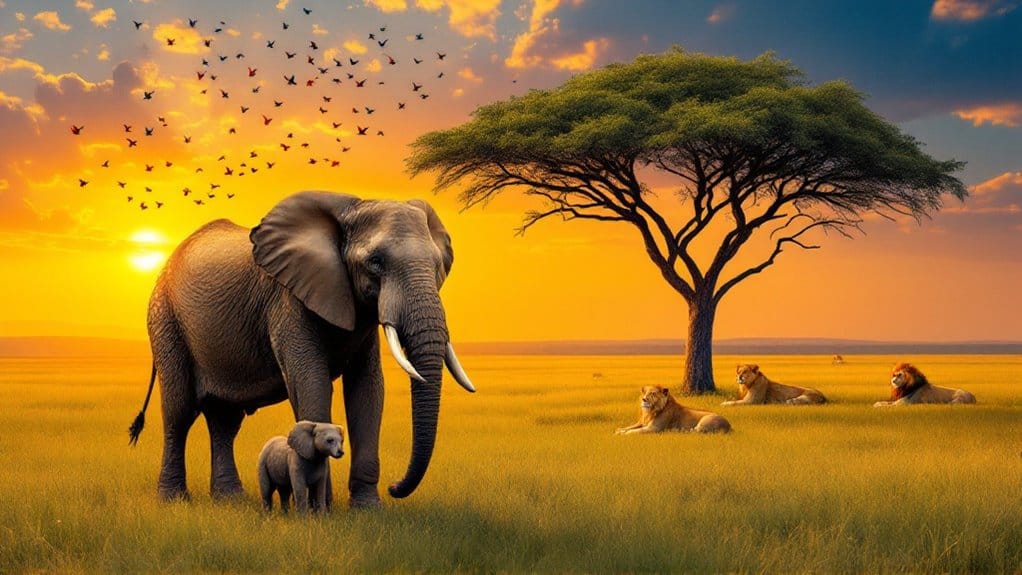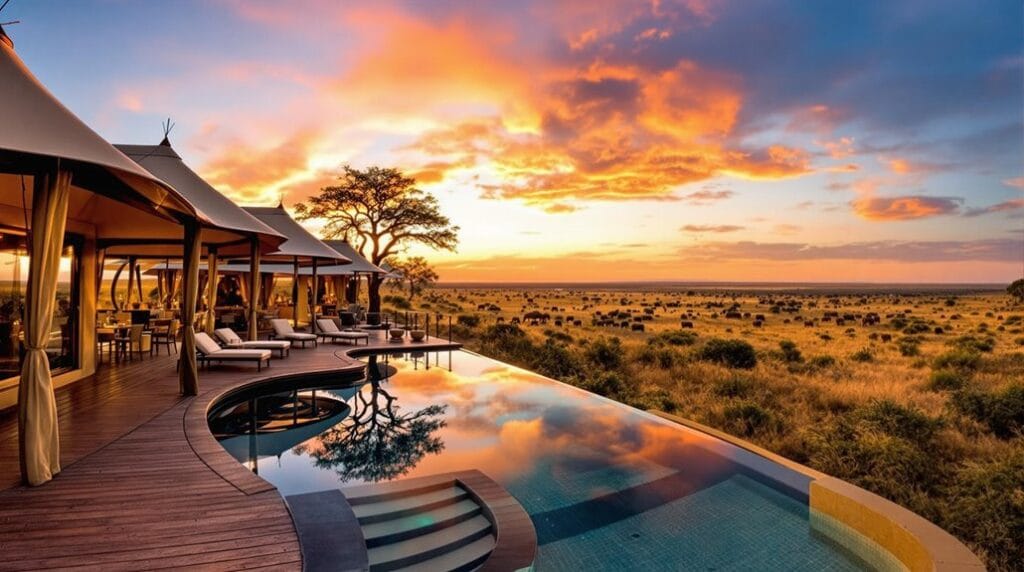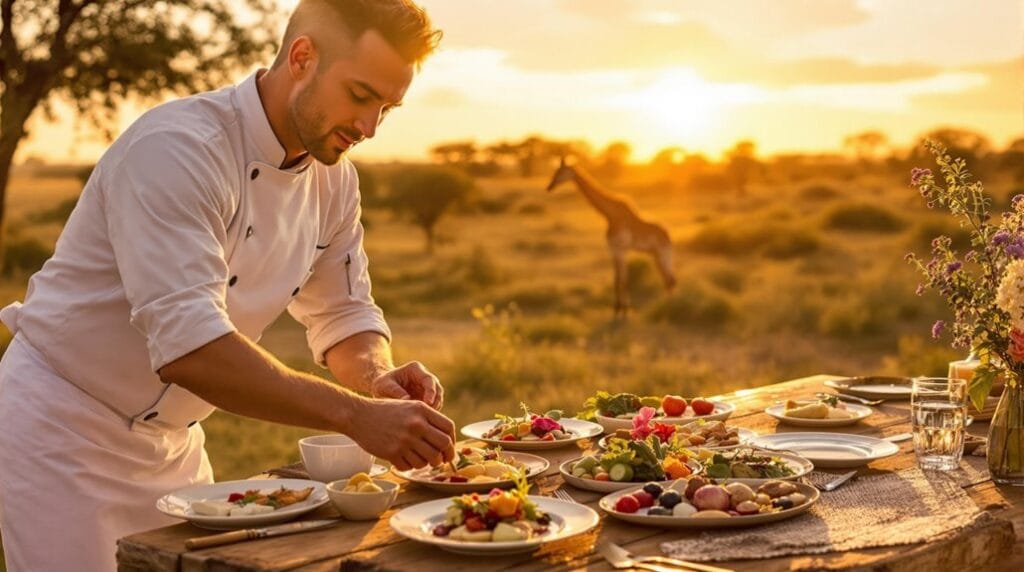When you consider the cultural importance of African wildlife, you'll find it's intricately tied to the identity and beliefs of indigenous communities. Animals represent more than just species; they symbolize ancestors, embody virtues, and play essential roles in rituals that strengthen community ties. Yet, as habitat loss and environmental threats loom, the very essence of these cultural connections hangs in the balance. What does this mean for the future of both wildlife and the communities that rely on them?
Key Takeaways
- Wildlife embodies spiritual beliefs, symbolizing ancestors and deities, reinforcing cultural identity among many indigenous African communities.
- Traditional ecological knowledge promotes sustainable wildlife management, ensuring harmony between humans and nature.
- Festivals and ceremonies celebrating wildlife strengthen cultural ties and community cohesion.
- Animals serve as cultural totems, like elephants and lions, reflecting community values and beliefs.
- Habitat loss disrupts the cultural fabric of communities reliant on wildlife for their spiritual and daily lives.
Significance in Indigenous Cultures
In the heart of many indigenous African cultures, wildlife isn't just a backdrop; it's an important force that shapes their spiritual beliefs and daily lives. Animals represent ancestors, deities, and the cosmic balance that governs existence. This profound spiritual significance fosters a connection that transcends mere survival, weaving wildlife into the fabric of cultural identity.
Traditional ecological knowledge, passed down through generations, empowers communities to manage wildlife sustainably. You'll find that practices rooted in this knowledge guarantee a harmonious coexistence with nature, reflecting a deep-seated responsibility to protect species like elephants and lions, which are often seen as totems. These animals embody cultural values and remind you of the shared heritage that binds you to the land.
Creation myths and folklore further enrich this connection, teaching moral lessons that reinforce the role of wildlife in daily life. The economic reliance on wildlife for food, materials, and trade highlights its vital role in survival, intertwining cultural practices with everyday existence.
Spiritual Connections and Beliefs
Wildlife embodies a deep spiritual connection that resonates throughout many African cultures, intertwining with beliefs and practices that shape community identities. In your journey through these cultures, you'll find that animals like crocodiles, elephants, and lions aren't just creatures; they symbolize ancestral connections and cosmic balance.
Traditional beliefs elevate wildlife to sacred status, fostering a sense of responsibility towards wildlife conservation within families and clans. Totems link specific animal species to clans, serving as symbols of protection and guidance.
You might witness rituals and ceremonies that involve animal sacrifices, reflecting the profound spiritual significance attributed to wildlife as a way to communicate with deities and honor ancestors. Festivals like the Dipo initiation ceremony celebrate local wildlife, reinforcing these spiritual connections and promoting awareness of their essential roles.
Local folklore often emphasizes the importance of wildlife in maintaining harmony between humans and the natural world. By recognizing these spiritual connections, you can appreciate how integral wildlife is to cultural identity, fostering a sense of belonging that transcends generations.
Embracing these beliefs not only honors tradition but also enhances the collective commitment to preserving Africa's rich wildlife heritage.
Economic Contributions of Wildlife
Through the vibrant lens of eco-tourism, many African communities thrive economically, showcasing the incredible contributions of wildlife. This flourishing sector generates billions in revenue, creating jobs and enhancing economic stability for local communities.
When you support eco-tourism, you're not just experiencing the beauty of nature; you're directly impacting livelihoods and fostering sustainable practices that benefit both people and wildlife.
Wildlife conservation initiatives are essential in this equation. They attract international funding and partnerships, bolstering local economies while promoting sustainable development. As you engage with these initiatives, you help empower local communities to protect their natural heritage, ensuring that future generations can enjoy these resources.
Moreover, the trade of animal products, including meat and crafts, plays a significant role in sustaining rural households. It not only provides necessary goods but also preserves cultural identities and social cohesion.
The presence of diverse wildlife can even enhance agricultural productivity, offering important ecosystem services like pollination that underpin food security.
Traditional Practices and Daily Life
Deeply rooted in the fabric of African cultures, traditional practices involving wildlife not only shape daily life but also reinforce community identity and ancestral connections. For indigenous communities, these practices are crucial to their survival and cultural heritage.
Here's how wildlife intertwines with daily existence:
- Hunting and Gathering: This age-old practice provides food, tools, and materials essential for livelihood, reflecting a deep respect for wildlife populations.
- Spiritual Beliefs: Certain species are revered and considered sacred, fostering a sense of responsibility to protect them within the community.
- Festivals and Ceremonies: Events like the Dipo initiation ceremony celebrate wildlife, promoting awareness of ecological importance while strengthening cultural ties.
- Traditional Ecological Knowledge: Passed down through generations, this wisdom guides sustainable practices for managing resources and conserving wildlife, ensuring both cultural and natural heritage endure.
Challenges in Wildlife Conservation
Wildlife conservation faces urgent challenges that can't be ignored, from poaching and trafficking to habitat loss and human-wildlife conflict.
These issues not only threaten the survival of precious species but also jeopardize the cultural connections many communities have to their environment.
If we want to protect both wildlife and the rich traditions tied to them, we must confront these challenges head-on.
Human-Wildlife Conflict Issues
In recent years, human-wildlife conflict has become a pressing challenge for wildlife conservation efforts across Africa. As agricultural land expands into wildlife habitats, encounters between humans and animals are on the rise. This leads to property damage, injury, and even loss of life, particularly in areas where large predators roam.
Local communities, reliant on agriculture and livestock, often struggle with economic challenges that make conservation seem less beneficial.
Here are four critical factors contributing to this conflict:
- Illegal hunting intensifies wildlife pressures, leading to a cycle of loss and retaliation.
- Habitat encroachment from farming reduces natural spaces for wildlife, increasing human-animal interactions.
- Economic challenges force communities to prioritize short-term survival over long-term conservation.
- Conservation strategies like buffer zones and non-lethal deterrents often lack resources and local buy-in.
To truly address these issues, collaboration between conservation organizations and indigenous communities is essential.
By developing sustainable solutions that balance human needs with wildlife protection, we can foster a sense of belonging and shared responsibility for Africa's breathtaking wildlife.
Your engagement in this cause can make a difference!
Poaching and Trafficking Threats
As human-wildlife conflict intensifies, another dark shadow looms over Africa's rich biodiversity: poaching and trafficking. This illegal wildlife trade, valued at a staggering $23 billion annually, threatens not just endangered species like elephants and rhinos but the very fabric of African cultures that cherish these magnificent animals.
Imagine 20,000 elephants slaughtered each year for their ivory, or rhinos facing extinction due to demand for their horns.
Organized crime syndicates complicate conservation efforts, making it harder to protect wildlife and preserve the delicate balance of ecosystems. When poaching escalates, it fuels retaliatory killings, further endangering species while undermining local conservation initiatives.
We can't stand by and let this happen. International cooperation is crucial. Initiatives like the Convention on International Trade in Endangered Species (CITES) aim to regulate the trade of threatened species, but they need your support.
By raising awareness and advocating for responsible practices, you can help safeguard Africa's wildlife. Together, we can fight against poaching and trafficking, ensuring that future generations inherit a world rich in biodiversity and the vibrant cultures that celebrate it.
Join the movement for wildlife conservation today!
Habitat Loss Concerns
While you may not realize it, the loss of natural habitats in Africa has a profound impact on both wildlife and local communities. Habitat loss threatens biodiversity, disrupts traditional practices, and fuels wildlife trafficking, creating a cascade of challenges that affect us all.
Here are four crucial concerns to reflect upon:
- Agricultural Expansion: Nearly 40% of Africa's land could become agricultural by 2050, pushing wildlife into smaller, fragmented spaces.
- Urbanization: As cities grow, natural landscapes vanish, further straining the ecosystems indigenous communities depend on.
- Climate Change: Rising temperatures and altered rainfall patterns degrade essential habitats like wetlands and forests, pushing species to the brink.
- Insufficient Protected Areas: Covering only 13% of Africa's land, these areas often aren't enough to safeguard wildlife populations effectively.
The consequences of habitat loss go beyond wildlife; they threaten the cultural fabric of indigenous communities who've lived in harmony with nature for generations.
It's time to unite for conservation, ensuring both wildlife and local cultures thrive. Together, we can embrace sustainable practices that honor our shared heritage and protect the future.
Community-Based Conservation Efforts
When you empower indigenous communities, you release the potential for sustainable resource management that honors their local knowledge.
By integrating traditional ecological wisdom, you create a powerful alliance that not only protects wildlife but also enhances biodiversity.
This approach fosters a deep-rooted commitment to conservation that benefits both people and nature, ensuring that Africa's rich wildlife thrives for generations to come.
Local Knowledge Integration
Community-Based Conservation (CBC) efforts are revolutionizing the way we protect Africa's wildlife by seamlessly blending traditional ecological knowledge with contemporary conservation strategies.
This local knowledge integration not only enhances biodiversity but also fosters sustainable resource management. When you support these initiatives, you're playing a crucial role in empowering indigenous communities.
Here are four key aspects to evaluate:
- Community Conservancies: Successful models like those in Namibia show how local management can lead to higher biodiversity and healthier ecosystems.
- Economic Incentives: Projects like the Niassa Carnivore Project in Mozambique demonstrate that wildlife tourism can bring economic benefits, incentivizing the protection of endangered species.
- Collaborative Knowledge Exchange: The partnership between scientists and indigenous communities allows for the sharing of knowledge, improving conservation outcomes while respecting cultural practices.
- Supportive Policies: Recognizing and incorporating traditional practices in wildlife management is essential for the sustainability of conservation efforts.
Empowering Indigenous Communities
Empowering indigenous communities is essential for the success of conservation efforts, as these local populations possess invaluable knowledge about their ecosystems.
By involving them in wildlife management decisions, you're not just helping protect biodiversity; you're also fostering sustainable practices that enhance community livelihoods.
Take inspiration from Namibia's partnership to protect desert-adapted elephants, where local knowledge and traditional ecological practices have greatly boosted conservation outcomes.
When communities see economic benefits from wildlife tourism, like in community conservancies, they become motivated to actively protect their natural resources.
This creates a powerful cycle of conservation that uplifts both the land and its people.
Additionally, collaborative projects, such as the Niassa Carnivore Project in Mozambique, highlight the beauty of merging traditional ecological knowledge with modern science.
Sustainable Resource Management
Sustainable resource management thrives when local communities take the lead in conservation efforts. By embracing Community-Based Conservation (CBC), you empower local populations to actively participate in wildlife management, fostering a sense of belonging and responsibility.
Here's why your involvement matters:
- Integrating Traditional Ecological Knowledge: Your insights on species behaviors enrich scientific approaches, enhancing biodiversity preservation.
- Promoting Sustainable Practices: When you prioritize ecological stewardship, you guarantee that conservation goals align with community needs, benefiting both people and wildlife.
- Boosting Economic Benefits: Projects that intertwine wildlife tourism with local stewardship not only protect nature but also provide economic opportunities for your community.
- Fostering Partnerships: Policies increasingly recognize the value of indigenous practices, creating collaborative efforts between communities and governments to combat poaching and support sustainable development.
When you take an active role in these initiatives, you're not just protecting the environment; you're cultivating a legacy for future generations.
Together, let's embrace sustainable resource management to safeguard Africa's precious wildlife and enrich our communities. Join the movement, and be part of something bigger!
The Role of Global Organizations
Across Africa, global organizations play an indispensable role in wildlife conservation, bridging the gap between modern practices and traditional cultural values. By collaborating with local communities, organizations like the African Wildlife Foundation (AWF) and World Wildlife Fund (WWF) integrate cultural practices into their conservation efforts. This approach not only respects indigenous knowledge but also enhances wildlife management strategies that resonate with the people who live alongside these majestic creatures.
These organizations are essential in combating poaching and the illegal wildlife trade, which threaten both biodiversity and the cultural significance of wildlife in Africa. By promoting eco-tourism, they help generate revenue for local communities, fostering a deeper appreciation for the cultural importance of wildlife. Imagine being part of a movement that supports sustainable practices while celebrating the rich heritage tied to Africa's natural treasures.
Global partnerships among NGOs, local governments, and indigenous groups create robust frameworks for conservation that acknowledge and honor the cultural ties communities hold with wildlife.
You can feel empowered knowing that your support for these global organizations contributes to preserving not just the environment, but also the vibrant cultures intertwined with Africa's incredible wildlife.
Frequently Asked Questions
Why Is African Wildlife Important?
African wildlife's essential because it sustains ecological balance and biodiversity preservation.
You'll find that conservation efforts not only protect these magnificent species but also enhance tourism revenue, benefiting local communities.
Engaging in traditional practices fosters a connection to the land and wildlife, while community engagement guarantees everyone plays a part in safeguarding these treasures.
Why Are Animals Important in African Culture?
Animals aren't just important in African culture; they're the heartbeat of its vibrant tapestry!
Through animal symbolism, you'll discover how spiritual beliefs and cultural narratives intertwine in traditional practices. These creatures embody community identity, connecting you to ancestral roots and fostering conservation ethics.
Celebrating wildlife isn't merely a ritual; it's a powerful call to protect the environment and honor the sacred bonds that unite you with nature and your heritage.
What Is the Importance of African Culture?
African culture's importance lies in its vibrant tapestry of traditions and ancestral beliefs that bind communities together.
You'll find that community rituals and storytelling practices foster a deep sense of belonging and identity. These cultural expressions not only celebrate heritage but also strengthen spiritual connections to the land.
Additionally, embracing conservation efforts guarantees that future generations can experience this rich legacy, highlighting the dynamic interplay between culture, community, and the environment.
Why Is Wildlife Important in South Africa?
Wildlife in South Africa's essential for numerous reasons. It drives tourism revenue, attracting millions who want to witness its breathtaking biodiversity.
By engaging in conservation efforts, you help protect these ecosystems, ensuring balance for future generations. Community engagement is imperative, as local populations benefit from educational initiatives that promote sustainable practices.
When you support wildlife preservation, you're not just saving animals; you're fostering a sense of belonging and connection to the land and its heritage.
Conclusion
In a world buzzing with technology, it's easy to forget the profound cultural importance of African wildlife. These majestic animals are more than just Instagram-worthy photos; they embody the spirit and traditions of indigenous communities. By valuing and protecting wildlife, you're not just conserving nature—you're preserving rich cultural identities and fostering sustainable practices. Let's rally together, respect indigenous wisdom, and guarantee that future generations can experience the vibrant tapestry of life that wildlife weaves into the heart of Africa.








